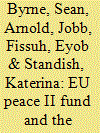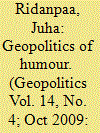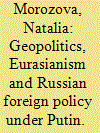|
|
|
Sort Order |
|
|
|
Items / Page
|
|
|
|
|
|
|
| Srl | Item |
| 1 |
ID:
092325


|
|
|
|
|
| Publication |
2009.
|
| Summary/Abstract |
Economic aid is one component of peacebuilding that has been given increasing prominence in its ability to build both sustainable peace and development. This article analyses the impact of economic aid on peacebuilding initiatives, looking at the case study of Northern Ireland. Through qualitative and quantitative data analysis, this article addresses whether international economic assistance is able to target the structural forces that have been known to exacerbate ethnic conflicts, and points to both its successes and failures in the perception of the civilian population.
|
|
|
|
|
|
|
|
|
|
|
|
|
|
|
|
| 2 |
ID:
092326


|
|
|
|
|
| Publication |
2009.
|
| Summary/Abstract |
If pyrrhic victory had an antonym, it would describe a loss with dramatic yet unanticipated benefits, a victory disguised as defeat. This essay's central assertion is the Vietnam War was a geopolitical victory for the United States. The war was a victory disguised as defeat. Nicholas Spykman's analysis of the United States' geopolitical position in America's Strategy in World Politics is applied along with older and post-Cold War Vietnam War historiography. Saul Cohen's maritime conception of the Cold War is also employed. The 1965 American ground force intervention in Vietnam geopolitically secured Indonesia in the Western strategic-economic orbit in the Cold War. The unanticipated benefit, making the Vietnam War pyrrhic victory's antonym, is the intervention's role in the movement of the Sino-American relationship from that of enemy to rapprochement to tacit alliance in the 1970s. This movement illustrates a recent historiographical assertion the war intensified communist bloc fractures beyond repair, reoriented international politics, and made a major contribution to the US Cold War victory.
|
|
|
|
|
|
|
|
|
|
|
|
|
|
|
|
| 3 |
ID:
092330


|
|
|
|
|
| Publication |
2009.
|
| Summary/Abstract |
Humour and cartoons are commonly perceived as practices of innocent entertainment, but the crisis following the publishing of twelve cartoons of the prophet Muhammed in the Danish newspaper Jyllands-Posten finally proved what serious matters popular culture, cartoons and humour can be. One repercussion of this notorious cartoon crisis was the publication in Kaltio, a minor cultural journal produced in northern Finland, of a comic strip in which various questions concerning the Muhammed cartoon episode and the political hypocrisy of the Finnish government were discussed satirically. This precipitated another, albeit minor, crisis which was noted widely around the world. Through these two interlinked incidences, the present paper discusses how humour functions as a 'tool' giving impetus to various forms of geopolitical processes and discussions in a range of contextual circumstances and at different spatial levels, resulting in both politically affirmative and destructive effects. It also discusses how the geopolitical order, discourses and codes can divert the reception and interpretation of humour.
|
|
|
|
|
|
|
|
|
|
|
|
|
|
|
|
| 4 |
ID:
092329


|
|
|
|
|
| Publication |
2009.
|
| Summary/Abstract |
Through an analysis of a speech held by Finnish Minister of Defence Jyri Hkmies at CSIS in Washington in 2007, the article scrutinizes the new emergence of "geopolitics" in international politics. Although its novelty is debatable, in this new geopolitical discourse the main focus is not related to the spatial borders of a nation state but instead to securing territory beyond these borders. It seems that "common values", basically undefined but allegedly including such ideas like democracy, are related to this new form of "geopolitics". In contrast to traditional geopolitics and identity politics, the global or cosmopolitical "us" defending common values seems to be a changing coalition and other countries appear only as objects of its operations. Only Russia, waking from its decade-long hibernation, emerges as a potential challenge to "us". Curiously enough, its awakening also brings geopolitics back. The analysis of the speech reveals that the "new situation" requires choosing friends and enemies that are not clearly defined in the classical geopolitical sense. Even in the traditional sense of protecting the borders etc., the geopolitical security of Finland is best protected through acting for the geopolitical security of the whole world, no matter where or when that might require our presence. But from where does, for instance, the legitimacy of the operations of "us" derive? In the speech of minister Hkmies, many of the classical themes of political theory reappear, though in a new form. It is guided by geopolitical concerns, but the geopolitics it entails is rather different from the traditional way of thinking about it. This also creates a need to rethink some central concerns of political theory.
|
|
|
|
|
|
|
|
|
|
|
|
|
|
|
|
| 5 |
ID:
092327


|
|
|
|
|
| Publication |
2009.
|
| Summary/Abstract |
Although the "rise" of geopolitics and Eurasianism to discursive prominence within the Russian post-Soviet foreign policy discourse has been widely discussed in the literature, their relegation to the margin of the said discourse a decade later has passed largely unnoticed. Only a few attempts to account for this fall from grace exist, and their proponents agree that Eurasianism had become a spent force in Russian politics by the time of President Putin's ascendancy to power because it failed to sustain a coherent foreign policy, particularly following Russia's failure to restore its pre-eminence in the post-Soviet space. On the level of practical geopolitical reasoning, therefore, Eurasianism is reduced to geopolitics, i.e. the politics of spheres of influence and hegemonic spatial control, while Eurasian identity construction is dismissed as unconvincing, strategic and self-serving. However, this article attempts to provide an alternative explanation for the decline of Eurasianism under Putin - the one that focuses on the attempt within post-revolutionary and post-Soviet Eurasianism to theorise both a unique identity and a credible ideology, i.e., what Eurasianists themselves termed "ideocracy". Therefore, a classification of Russian geopolitical thinking is provided according to the different ways in which the intellectual legacy of classical Eurasianism is being invoked and appropriated. Both 'traditionalist' and 'modernist' geopoliticians invoke Russia's Eurasian identity in order to answer the practical question 'how?' - how Russia should preserve its territorial integrity and enhance its international standing. Proponents of 'civilisational' geopolitics, on the contrary, employ the ideational resources of classical Eurasianism in order to answer the question 'what?': what is Russia in the post-Cold War world. It is argued that the answer to this latter question - given that two possible attempts to apply Eurasian ideocracy to post-Soviet conditions have developed - is a necessary step to answering the question "why?": why Eurasianism has been effectively sidelined under Putin turning into a metaphorical dog that did not bark.
|
|
|
|
|
|
|
|
|
|
|
|
|
|
|
|
| 6 |
ID:
092323


|
|
|
|
|
| Publication |
2009.
|
| Summary/Abstract |
In the world scenario of US unilateralism, this paper argues the competition for control over Africa's resources between the major powers (United States, the European Union and China) provides a renewed geostrategic situation for the Canary Islands (Spain). First, the political and economic rivalry over Northwest Africa adds new dimensions to the geostrategic location of the Archipelago, which constitute NATO's southern flank and a logistic platform for neighbouring Africa. Second, it focuses on the particular case of the industrial megaport envisaged for Granadilla (Tenerife), examining its geostrategic projection as an important infrastructure both for the Canarian ruling elites' geoeconomic interests and also for the geopolitical interests of the major world powers.
|
|
|
|
|
|
|
|
|
|
|
|
|
|
|
|
| 7 |
ID:
092328


|
|
|
|
|
| Publication |
2009.
|
| Summary/Abstract |
The creation of an undivided Europe without borders raises questions about the present-day significance of political territoriality in Europe. The article presents a conceptualisation of political territoriality to indicate its significance. Political territoriality is defined here as an active strategy to control by controlling a geographical area. The implications of territorial control are labelled here the logic of territoriality, comprising geographical fixity, impersonality, geographical inclusion/exclusion and centrality. The more salient territorial control is, the more this logic of territoriality leaves its imprint on policies, politics and polities. This variable conceptualisation of political territoriality not only allows for more refined comparisons of time and place in Europe and elsewhere than a rigid Westphalian understanding of territoriality would. It also enables one to determine where and when making the fundamental distinction in the discipline of political science between Comparative Politics and International Relations is justified, providing a common vocabulary for both disciplines in analysing changing political territoriality.
|
|
|
|
|
|
|
|
|
|
|
|
|
|
|
|
| 8 |
ID:
092324


|
|
|
|
|
| Publication |
2009.
|
| Summary/Abstract |
The changing geographical foci of the geopolitical code of the United States are examined by a content analysis of the presidential State of the Union Speeches between 1988 and 2008, the last year of President Reagan's term through the presidency of George W. Bush. The State of the Union speeches are interpreted as geopolitical discourse within a structural setting, using seven foreign-policy paradigms as an organising framework. The empirical findings illustrate an increase over time in the number of regions and countries mentioned in the speeches. Also, notable differences between administrations in terms of their advocacy of globalist or regionalist policies and emphasis upon allies or adversaries are found.
|
|
|
|
|
|
|
|
|
|
|
|
|
|
|
|
|
|
|
|
|